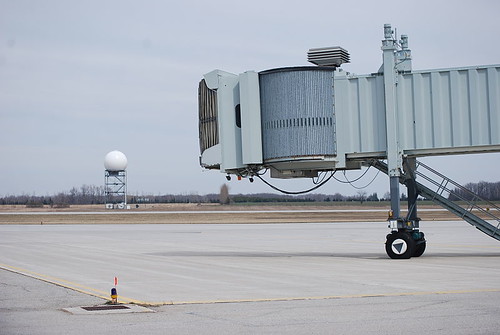I’m still out on leave, but I’ll be back soon. Enjoy this post about small communities . . .
–
Over 70% of US airports with commercial air service are served exclusively by regional airlines. And almost all of those airports reside in or next to small or midsize communities. Unfortunately, both the communities and regional airlines face head winds in the coming years. New regulations coupled with the potential for additional taxes and reductions in subsidies will hamper the regionals’ ability to grow and operate with sustained profitability. This will have a direct effect on the small communities that regional airlines serve.
Most people have never heard of Pinnacle Airlines, ExpressJet Airlines, or Republic Airlines but have flown on them many times. An average regional airline flies turboprop aircraft or jet aircraft with less than 100 seats on a contract basis for mainline carriers such as United or Delta. Although separate companies, the regionals usually fly under the mainline’s brand such as Delta Connection or United Express. In most cases, Delta and United take care of scheduling, promoting, and selling tickets for the flights while the regional takes care of providing the primary product. Now, let’s hop into some of the issues.
One of the bigger impacts to the industry will be felt when new rules regulating pilot duty time kick in. (Cranky did a good job of breaking down this issue in a previous post.) These new rules were introduced to address ongoing concerns about pilot fatigue. Pilots will now work a little less and get more rest. This makes sense. Who doesn’t want a well-rested pilot at the controls?
But there is a flip side. The new rules governing duty and rest periods will force carriers to hire more pilots if they want to run the same schedules they have today. The savvy regionals will work diligently with their mainline partners to reoptimize schedules. But they will not be able to totally avoid higher pilot costs. Regionals will have to pass on the additional costs to their mainline customers to remain at current profitability levels.
Another new upcoming regulation will increase the minimum number of hours of experience a pilot needs to fly for an airline. Currently, a pilot only needs 250 hours along with a Commercial License to get hired with a regional airline. In a couple of years, this will increase to 1,500 hours and require an Airline Transport Pilot (ATP) certificate.
On the surface, this seems like a no brainer. More hours = more experience = safer flying. But there isn’t research proving that pilots with 1,500 hours consistently fly safer than someone with less experience. When this steep increase is implemented, it will create an artificial pilot shortage. Some pilots pay out of pocket or through loans to get to 250 hours. Getting to 1,500 hours on one’s own dime will push a bunch of would-be pilots out of the market. The shortage will push up wages to account for the lower supply and result in additional expenses.
In the fall of 2011, the Obama administration proposed creating a new $100 departure tax for all air carrier departures and general aviation jet departures. The proposal also increased security taxes on airline tickets and was given to the super committee for consideration. An impressive coalition of 30 organizations including airline trade groups, general aviation groups, unions, and manufacturers quickly got together to fight the proposal. The rally cry is that airlines and passengers already pay higher taxes than alcohol, tobacco and guns which are intentionally set high to discourage their use.
It appears that the White House quietly backed off the proposal because of the backlash it received during an election cycle. If the proposal was revisited and passed, it would have a disproportionate effect on regional airlines that carry fewer passengers each flight than their mainline counterparts. It’s much cheaper to spread $100 over 200 passengers than over 50.
Another debate in Congress has been the over subsidizing air service to small communities through the Essential Air Service (EAS) program. This program is designed to help provide small communities with air service that cannot, due to such low demand, support itself. I expect a haircut or possibly elimination of this program. Accordingly, many routes would cease to exist.
In isolation, each of these challenges would have a much smaller impact on the industry. Together, these policies would have significant negative economic effects and force airlines to cut flights on underperforming routes. And each flight lost in a small community has larger implications due to the community’s relative size.
These changes will burden an industry already struggling with consolidation and high fuel prices. Pinnacle is flirting with bankruptcy. SkyWest and Republic’s financials have been limping along since their acquisitions of ExpressJet and Frontier respectively. American Eagle’s anticipated spinoff from American Airlines will increase competition in an already saturated market. We’re seeing a steep decline in small jets which don’t work with today’s fuel prices. Turning a good profit in the regional industry is proving difficult even while their mainline counterparts are starting to enjoy being in the black.
Some municipalities and the airlines will come up with creative solutions to mitigate the effects. They will also need to continue lobbying the government to implement policies that have positive economic effects. Regardless, it appears that the end result will be fewer options in small communities.
–
Matt Tregre is an airline enthusiast and has held positions in finance, revenue management, pricing, customer service, and baggage tossing with stints at Southwest, ExpressJet, & Pinnacle. During school, he developed marketing plans for small airports. He now works in revenue strategies for a corporate aviation company and greatly misses having flight benefits.
[Original photo via Wikimedia Commons user Paranomia/CC 3.0]


No comments:
Post a Comment